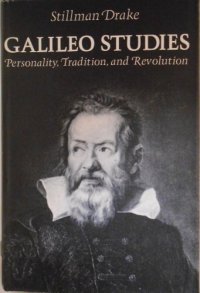
Ebook: Galileo Studies: Personality, Tradition, and Revolution
Author: Stillman Drake
- Tags: Reference, Almanacs & Yearbooks, Atlases & Maps, Careers, Catalogs & Directories, Consumer Guides, Dictionaries & Thesauruses, Encyclopedias & Subject Guides, English as a Second Language, Etiquette, Foreign Language Study & Reference, Genealogy, Quotations, Survival & Emergency Preparedness, Test Preparation, Words Language & Grammar, Writing Research & Publishing Guides, Astronomy, Astronomy & Space Science, Science & Math
- Year: 1981
- Publisher: University of Michigan Press
- City: Ann Arbor
- Edition: 1st
- Language: English
- pdf
The ideas of Galileo Galilei have had profound consequences for Western thought. In Galileo Studies, the distinguished scholar Stillman Drake presents his famous subject in a unique and insightful new light.
Historians of science have traditionally concerned themselves with the continuities of medieval and modern thought, and with the evolution of physics and astronomy after Galileo's time. Such an approach has tended to obscure the elements of Galileo's work which were misconstrued or ignored by such later investigators as Bacon, Descartes, and Locke. A fictitious thinker is substituted for the real man.
Stillman Drake's book offers a necessary complement to the historical approach, by focusing on the individuality of Galileo's creative work. With a view to placing the origins of modern science in better perspective, Drake examines Galileo's discoveries in isolation from a supposed continuity with the past and from analogies with later scientific developments. The aim is to see Galileo's work as he himself approached and evaluated it. Galileo's unique contributions are viewed against the intellectual backdrop of the age; and his scientific personality is revealed in his work with the telescope, his theory of the tides, and his dispute with the hidebound advocates of traditional science and philosophy.
Historians of science have traditionally concerned themselves with the continuities of medieval and modern thought, and with the evolution of physics and astronomy after Galileo's time. Such an approach has tended to obscure the elements of Galileo's work which were misconstrued or ignored by such later investigators as Bacon, Descartes, and Locke. A fictitious thinker is substituted for the real man.
Stillman Drake's book offers a necessary complement to the historical approach, by focusing on the individuality of Galileo's creative work. With a view to placing the origins of modern science in better perspective, Drake examines Galileo's discoveries in isolation from a supposed continuity with the past and from analogies with later scientific developments. The aim is to see Galileo's work as he himself approached and evaluated it. Galileo's unique contributions are viewed against the intellectual backdrop of the age; and his scientific personality is revealed in his work with the telescope, his theory of the tides, and his dispute with the hidebound advocates of traditional science and philosophy.
Download the book Galileo Studies: Personality, Tradition, and Revolution for free or read online
Continue reading on any device:

Last viewed books
Related books
{related-news}
Comments (0)